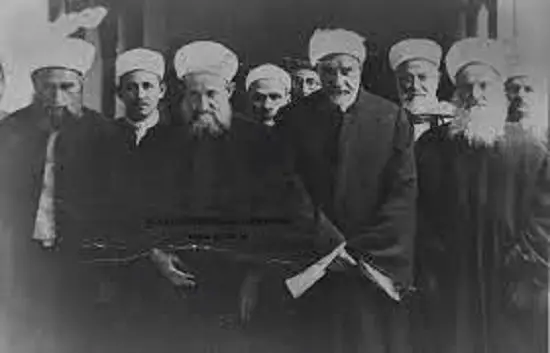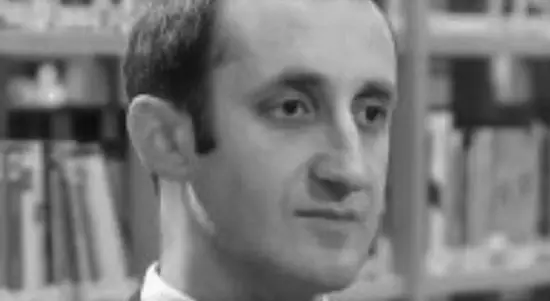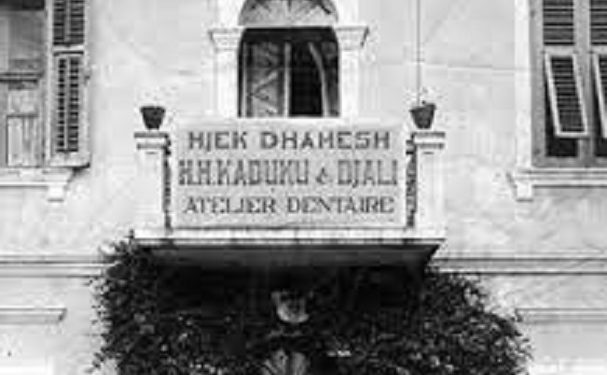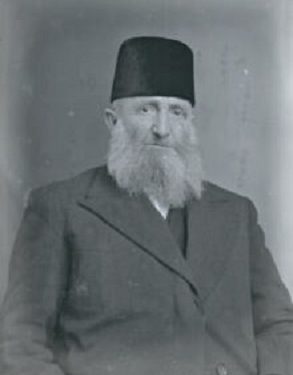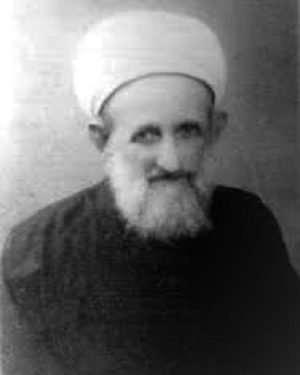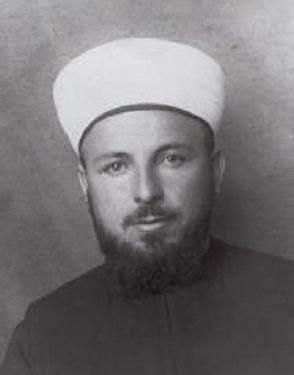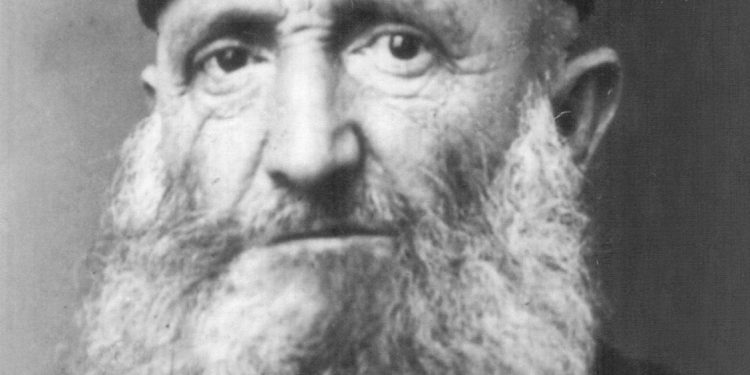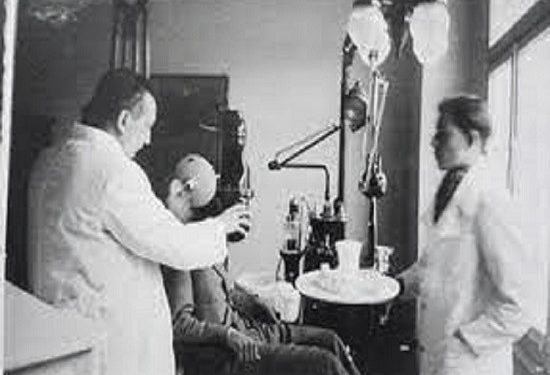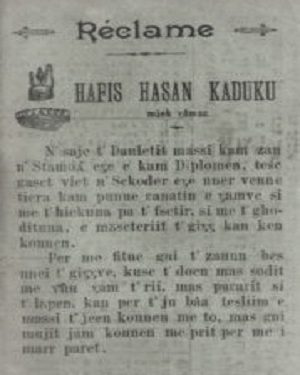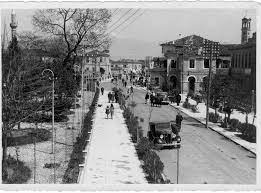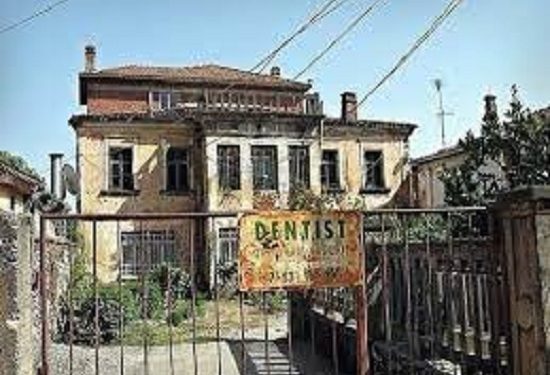From Genti Kruja
Memorie.al / Hasan Kaduku was born in Shkodër and was the eldest son of the five sons of Ismail (Mala) Kaduku, a well-known merchant in the city’s bazaar in leather processing, an honest, knowledgeable and patriotic man. Hasan was the elder brother of Haxhi Ibrahim Kaduku, who performed important tasks in the service of Islam and his country, the brother of Riza Kaduku, functionary in the Muslim Community in the financial sector, Sulejman (who owned the most modern stationery), as and Hafiz Yusuf Kadukut, a religious leader educated like his brothers, (Hasan and Ibrahim) at the University of Istanbul, where he was known for commenting on the Qur’an while there.
Hasan Efendi from a young age went to Istanbul to continue his schooling, where he settled near his uncle, Fetah Lini, where he also started working. There he met scholars of the time, from whom he also received mystical lessons, as well as began learning the Qur’an, reciting it by heart.
According to the Shkodra chronicler, Hamdi Bushati, (also known for his multi-volume work, “Shkodra and the weather”), his teachers had noticed that he had some problems with his first teeth, which had fallen out and prevented him from pronouncing them clearly. Arabic letters with “tajhvid”, who want a very clean vocal.
From the love he had for the Qur’an, he first decided that, parallel to the teaching of the Qur’an, he would fix his teeth, where he also got to know the profession of a dentist, which he immediately fell in love with. So he begs his dentist to hire him, but the dentist tells him there is no need.
Hafiz Hasani tells him that, “You don’t need me, but I need you and I’m ready to pay you a salary, just to stay by your side and learn the profession”, and that’s how it happened. Later, he began practicing with the famous dentist, Halid Shenazi Bey, and then with Professor Dionizi, who was of Armenian nationality. After securing the permit to practice the profession, he returned to his hometown, Shkodër.
Thus, for a short time of about three years, he became a Hafiz – the Qur’an and a dentist. Hafiz Hasani, upon returning from Istanbul to Shkodër, began practicing this profession, opening a portable clinic, going to the homes of that in need, as other doctors did.
But due to the great desire for high professionalism, with the opening of the Faculty of Dentistry at the University of Istanbul (1907), after working for several years as an amateur dentist, at an age when he was already married and had children, he was forced to go again in Istanbul, where out of the three years of study that the faculty had, he completed his studies for two years, a favor that was given only to those who had several years of practical knowledge.
Hafiz Hasani manages to become one of the most advanced students of the faculty, despite his almost 40-year-old age. In fact, his family members say that even the letters that came to him from the family, he did not open them until the weekend, in order not to be separated from his studies.
He managed to graduate in 1908 and immediately returned to his hometown, as the first dentist, or as he was otherwise known: “dentist” with a university degree, not only in Shkodër, but also in all of Albania. He also knew Arabic, Ottoman and French very well.
Hafiz Hasan Kaduku is considered as the man who laid the foundations of the modern dental service in his hometown, Shkodër.
Chronicler Hamdi Bushati says that Hafiz Hasan Kaduku practiced his profession as a dentist in several cities of Albania and Montenegro.
The chronicles of that time show that Hasan Kaduku, with the skills of a talented dentist, attracted the attention of all his fellow citizens, creating a wide clientele even outside the borders of the country, such as in Montenegro, etc.
All foreign consuls who were accredited in Shkodër, as well as dignitaries from other parts of the country, had Hafiz Hasan Kadukun as their dentist (or as it was called then “dentist”).
Shkodra at the beginning of the 20th century, being one of the westernmost points of the Ottoman Empire, had five foreign consulates, whose personnel often became patients of Hafiz Hasan.
Hafiz Dr. Hasan Kaduku bequeathed his profession to other family members, which at that time was one of the most popular in Shkodër. Haki Kaduku, the son of the first Albanian dentist, after completing high school in Austria and the Faculty of Dentistry in Istanbul, returned to Shkodër.
He followed his father’s profession, thus working together. Until he retired, Hakiu, the son of Hasan Kaduk, worked as a dentist in the Polyclinic of the city of Shkodra. He was a doctor who attached great importance to the education of youth, to health care. Haki Kaduku gave talks on dental care in state schools of all levels.
The tradition of the Kaduku family continued with other names. Qamurani, son of Haki and grandson of Hafiz Hasan, is the third generation of “dentists” of this family. Meanwhile, Hasan Haki Kaduku, the grandson of Hafiz Hasan, worked as a mathematics professor in the city’s schools.
While Mesereti, one of the daughters of Haki Kaduku, like her brother, a teacher in mathematics, would learn the basics of mathematics for many years, in the Madrasah “Haxhi Sheh Shamia” in Shkodër.
The researcher Osman Hoxha describes the figure of Hasan Kaduk like this: “A magnificent man, tall and broad-shouldered, eagle-eyed and vulture-nosed, with a white beard and very handsome, noble and generous, respected and shrewd, energetic and unyielding, loving and generous, he was always among people, who loved him and he loved them so much. It was of work but also of a rifle.
During the siege of Shkodra by the Montenegrins in 1912-1913, Hafiz Hasan Kaduku was lined up in the trenches, alongside other volunteers, performing his duty to the homeland.
In 1932, he also performed the Hajj ritual. People already knew him as Dr. Hajji Hafiz Hasan Efendi Kaduku”.
The expression: “I’m going to Kaduku”, for more than a century in Shkodër, means “I’m going to the dentist”. The famous “Kaduku” dental clinic, in 1948, would all be seized by the communist regime, thus causing many state clinics for dentistry in Shkodër and Tirana to be opened with the nationalized tools of Dr. Expired!
Hafiz Hasan’s clinic was located at the meeting point of the old Muslim and Catholic neighborhoods, which thus served as a compass of rapprochement between the two faiths, because the clients were from both neighborhoods.
A sign of tolerance is also a very interesting fact, where the Catholic magazine of the time “Elçija e Zemres s’Krishti”, from the year 1906 (years XVI, Dhetuer, 1906, no. 12), publishes an interesting advertisement of Hafiz Hasan Kaduk, of who invites clients to get fillings or dentures in his clinic and the money can be paid later, after they are used to the dentures or fillings and are satisfied with them.
Hafiz Hasan Kaduku was a complete intellectual for the time, so he enjoyed the respect of the city’s residents. He dressed tastefully and was loved both by his patients and by his large company. The anteroom where the patients waited were well furnished and equipped with books and magazines, and there were even children’s books or some toys.
His broad culture meant that he was also visited by high Catholic clergy, such as: Father Gjergj Fishta, Ndre Mjeda, Anton Harapi, etc. Fishta even dedicated these verses to Hafiz Hasan Kaduku, which show that he was treated by a prominent dentist:
“I have never bowed down,
Neither from going nor from uk,
But be wise and be a chicken,
To the chair of Kaduku”.
His son, Dr. Haki Kaduku, shows that Dr. Hasani was the first to use gold in filling teeth. He used a precise apothecary scale to ration the amount of gold for particular works.
When age took its toll, Hafiz Hasani moved to the laboratory and Haki to the clinic. He was the first to correspond with a London firm (A. SH. & Sons), from where he ordered his clinic, which he rented in various houses in Shkodra, one of which is also photographed from Marubi.
The well-known researcher, Professor Gëzim Uruçi, in his file “Prominent personalities in the memory of our mountaineers”, (Haxhi Dr. Efendi Kaduku and the crown of Kaduku in the village of Theth of Dukagjin), knows us with many stories, episodes and toponyms that open a very interesting new page for the figure of Hasan Kaduku.
Regarding this, Dr. Musa Bizaku, doing a monograph on the Kaduku generation. Hafiz Hasani was among the first vacationers and the first Muslim to spend the summer in the tourist village of Theth, since 1936, initially invited by the local chieftain, who was also his client.
Dr. Hasan, amazed by the beauties and waters of Theth, thinks of doing a humanitarian service to Theth, an incentive for emancipation, making an agreement signed by him and leaving his fingerprints, by the Bajraktar of Shoshi. He built the first water reservoir, opening canals towards the three main towers nearby.
For this reason, of the introduction of water into some houses for the first time, since that day, that krua is called “Kroni i Kaduku”. Thus, in addition to this, new toponyms also entered, such as: “Livadhi i Kaduku”, “Bajrakja e Kaduku”, etc.
He also invited the Thethians to come and get their teeth treated for free at his clinic in Shkodër. During his stay in the mountains of Theth, he collected and processed many medicinal plants, recognizing their value for curing many diseases evident in this area.
Dr. Hasan, according to the testimony of Lulash Marku, a villager in the area, had been visited a lot by the highlanders of that region, and he even read the letters that came to them with pleasure.
Hafiz Dr. During his life, Hasan Kaduku treated kings, princes, consuls, priests, diplomats and ordinary people. People of many nationalities also sat in his chair. Dr. Frederik Shiroka, would call Haxhi Hafiz Dr. Hasan Efendi Kadukun, “Legend of Albanian dentistry”. Memorie.al




